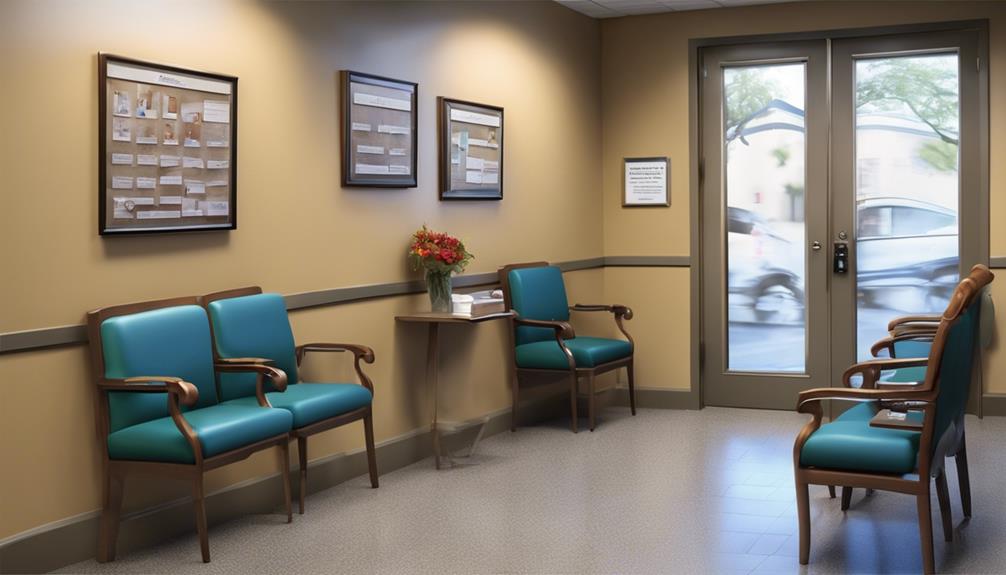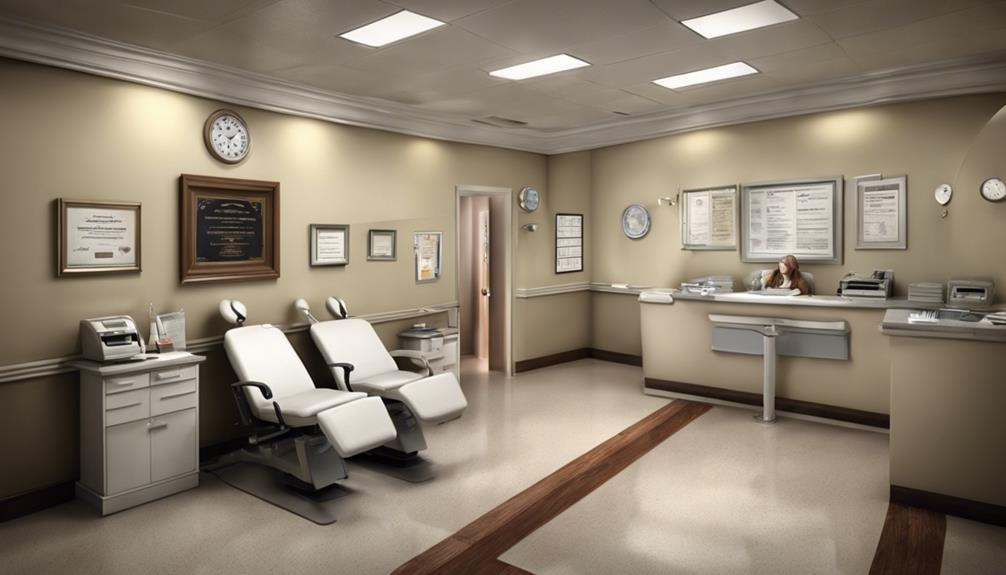When searching for a local Alzheimer’s specialist, it is important to navigate the intricate healthcare landscape. What criteria should you use to evaluate these dedicated healthcare providers?
Let's explore the key factors that can guide us towards making informed decisions and ensuring the best care for our loved ones facing Alzheimer's Disease.
Key Takeaways
- Consult primary care physician for Alzheimer doctor recommendations
- Use Alzheimer's Association website to locate nearby specialized doctors
- Access support services like support groups and counseling for patients and families
- Collaborate with a multi-disciplinary team for comprehensive Alzheimer care
Understanding Alzheimer's Disease

What causes Alzheimer's disease to develop in the brain?
Alzheimer's disease is a complex condition that involves various factors contributing to its development. One of the primary culprits is the accumulation of abnormal proteins in the brain, such as beta-amyloid plaques and tau tangles, which disrupt communication between nerve cells and lead to their eventual degeneration. These changes result in the characteristic symptoms of Alzheimer's, including memory loss, cognitive decline, and behavioral changes.
Additionally, genetic factors can play a role in increasing the risk of developing Alzheimer's disease, especially in familial cases where specific gene mutations are involved. Environmental factors, such as diet, exercise, and overall lifestyle, also impact the brain's health and may influence the onset and progression of Alzheimer's.
Understanding these underlying causes can help guide research efforts and improve our ability to diagnose and treat Alzheimer's disease effectively. By staying informed and proactive, we can better support those affected by this challenging condition and work towards a future with improved care and outcomes.
Importance of Early Diagnosis

Early diagnosis of Alzheimer's disease is crucial for timely intervention and improved management of the condition. Detecting the early signs can significantly impact the quality of life for individuals and their families. Here are some key reasons why early diagnosis is essential:
- Access to Treatment: Identifying Alzheimer's in its early stages allows for prompt initiation of treatment strategies that can help slow down the progression of the disease.
- Planning for the Future: Early diagnosis provides individuals with the opportunity to participate in decisions regarding their care, finances, and legal matters while they're still capable of doing so.
- Support Services: It enables patients and their loved ones to access a wide range of support services, including counseling, caregiver support, and community resources.
- Clinical Trials: Early diagnosis opens up the possibility of participating in clinical trials aimed at testing new treatments and interventions for Alzheimer's disease.
Finding Specialized Healthcare Providers

To ensure the best care for individuals with Alzheimer's disease, locating specialized healthcare providers experienced in managing this condition is crucial. These professionals possess the expertise and knowledge necessary to provide personalized care that caters to the unique needs of Alzheimer's patients. When searching for specialized healthcare providers, consider factors such as their experience, qualifications, and approach to treatment. To help you in this process, we have compiled a table outlining key considerations when choosing a healthcare provider for Alzheimer's care:
| Consideration | Description | Importance |
|---|---|---|
| Experience | Years working with Alzheimer's patients | High |
| Qualifications | Specialized training in dementia care | Essential |
| Approach to Treatment | Person-centered care vs. traditional methods | Significant |
Factors to Consider When Choosing

When choosing an Alzheimer doctor, it's crucial to consider factors like location options and specializations in Alzheimer care.
Our team understands the significance of finding a doctor who not only meets your geographical needs but also has the expertise to provide the best care for Alzheimer's patients.
These factors can greatly impact the quality of care and support you or your loved one receives.
Location Options for Alzheimer Doctors
Considering where to seek care for Alzheimer's is crucial for the well-being of both the patient and their family. When deciding on a location for Alzheimer's care, it's important to keep in mind the following factors:
- Proximity to Home: Choosing a facility close to home can make visitation easier and more frequent.
- Quality of Care: Research the reputation of the facility or doctor to ensure they provide high-quality care.
- Specialized Services: Look for locations that offer specialized services tailored to Alzheimer's patients' needs.
- Cost and Insurance Coverage: Check if the location is covered by your insurance and if the costs fit within your budget.
Specializations in Alzheimer Care
When selecting Alzheimer care options, one crucial aspect to consider is the specialized services offered to cater specifically to the needs of Alzheimer's patients. Different facilities or healthcare providers may offer various specializations that can enhance the quality of care for individuals with Alzheimer's disease. Here is a table highlighting some key specializations to look for when choosing Alzheimer care:
| Specialization | Description | Importance |
|---|---|---|
| Memory Care Programs | Tailored activities for memory | Essential for cognitive |
| stimulation and emotional support | stimulation and comfort | |
| 24/7 Monitoring | Constant supervision and support | Critical for safety and |
| to ensure immediate assistance | emergencies | |
| Dementia Training | Staff trained in dementia care | Vital for understanding |
| techniques and communication | and managing behaviors |
Assessing Doctor's Experience and Expertise

When evaluating a doctor's experience and expertise in Alzheimer's treatment, it's crucial to look into their training background to ensure they have the necessary qualifications.
Additionally, reading patient success stories can provide valuable insight into the doctor's track record and outcomes.
Understanding these aspects can help us make informed decisions when selecting a healthcare provider for Alzheimer's care.
Doctor's Training Background
Understanding a doctor's training background is crucial when evaluating their experience and expertise in treating Alzheimer's disease. When assessing a doctor, consider the following:
- Education: Look for doctors who've completed specialized training in neurology or geriatric medicine.
- Experience: Prior experience in diagnosing and managing Alzheimer's can indicate a higher level of expertise.
- Research: Doctors who've contributed to Alzheimer's research may bring innovative approaches to treatment.
- Continuing Education: Doctors who regularly attend conferences or workshops on Alzheimer's stay updated on the latest advancements.
Patient Success Stories
As we explore the realm of assessing a doctor's experience and expertise in treating Alzheimer's disease, delving into patient success stories offers invaluable insights into the quality of care provided. Hearing about real experiences can help us understand how a doctor's approach translates into positive outcomes for patients and their families. Below is a snapshot of some inspiring patient success stories that showcase the impact of skilled and compassionate Alzheimer's specialists:
| Patient | Success Story | Outcome |
|---|---|---|
| Mrs. S | Showed significant improvement in memory retention | Enhanced quality of life |
| Mr. L | Experienced better mood regulation and reduced confusion | Improved daily functioning |
| Ms. A | Family reported increased engagement and communication | Strengthened relationships with loved ones |
Locating Alzheimer Doctors Near You

To find Alzheimer doctors near you, start by consulting your primary care physician for recommendations or referrals. Your primary care physician has a network of healthcare professionals and can direct you to specialists who focus on Alzheimer's disease.
Additionally, you can explore the following options to locate Alzheimer doctors in your area:
- Contact your health insurance provider to inquire about in-network specialists who specialize in Alzheimer's care.
- Use online resources such as the Alzheimer's Association website to search for local doctors who have expertise in treating Alzheimer's patients.
- Reach out to local hospitals or medical centers and ask for recommendations for Alzheimer doctors within their facility.
- Seek recommendations from friends, family members, or support groups who may have experience with Alzheimer doctors in your community.
Tips for Scheduling Appointments

After finding Alzheimer doctors near you, it's essential to consider some helpful tips for scheduling appointments efficiently. When reaching out to schedule a visit, provide all necessary details about the patient's condition and any specific concerns. This information helps the staff prepare adequately for the appointment, ensuring the doctor can address all relevant issues. Be prepared to discuss the patient's medical history, current medications, and any recent changes in behavior or symptoms.
When calling to schedule an appointment, be flexible with your availability. Alzheimer's specialists may have limited openings, so being open to different time slots can help you secure a timely visit. If there are urgent concerns, don't hesitate to communicate them clearly to the office staff. They can often accommodate urgent appointments or provide guidance on the next steps to take. Additionally, inquire about any pre-appointment instructions or paperwork that need to be completed beforehand to streamline the process. By following these tips, you can make the appointment scheduling process smoother and more efficient.
Support Services for Patients and Families

Navigating the challenges of Alzheimer's disease can be overwhelming, which is why accessing support services for patients and families is crucial for holistic care. When dealing with Alzheimer's, having the right support can make a significant difference in the quality of life for both the individual with the disease and their loved ones. Here are some key support services that can help:
- Support Groups: Connecting with others who are going through similar experiences can provide emotional support and practical advice.
- Respite Care: Offering caregivers a break is essential for preventing burnout and ensuring the well-being of both the caregiver and the person with Alzheimer's.
- Educational Workshops: Learning more about the disease and how to manage its challenges can empower families to provide better care.
- Counseling Services: Professional counseling can help individuals and families navigate the complex emotions that come with Alzheimer's disease.
These services work together to create a strong support system that can lighten the burden and enhance the overall well-being of everyone involved.
Collaborating With a Multi-Disciplinary Team

As we navigate the complexities of Alzheimer's care, understanding the defined roles within a multi-disciplinary team is crucial.
Effective communication strategies play a key role in ensuring seamless collaboration among team members.
Coordinating patient care requires a cohesive effort from all involved parties to provide the best support and treatment for those affected by Alzheimer's.
Team Roles Defined
When working with a multi-disciplinary team, it's essential to clearly define each member's role to ensure effective collaboration and optimal patient care.
- Physician: Leads the medical management and treatment plans.
- Nurse: Provides direct patient care, administers medications, and monitors patient progress.
- Social Worker: Assists with emotional support, resources, and care coordination.
- Caregiver: Offers daily assistance, observes changes, and communicates with the team.
Each role is vital in providing comprehensive care for patients with Alzheimer's. By understanding and respecting the expertise of each team member, we can work together harmoniously to address the complex needs of those affected by this condition.
Let's continue to support one another in this journey of caregiving.
Effective Communication Strategies
To effectively collaborate with a multi-disciplinary team in the care of Alzheimer patients, clear and efficient communication strategies are crucial for ensuring seamless coordination and optimal outcomes. Effective communication involves active listening, sharing relevant information, and respecting each team member's expertise. Here are some key strategies for successful communication within a multi-disciplinary team:
| Communication Strategy | Description |
|---|---|
| Regular Team Meetings | Scheduled gatherings to discuss patient progress, treatment plans, and any arising issues. |
| Shared Electronic Platforms | Utilizing electronic systems for real-time updates, including patient records and care plans. |
| Clear Documentation | Ensuring all communications and decisions are documented clearly for reference. |
| Defined Roles and Responsibilities | Clarifying each team member's role and responsibilities to avoid duplication or oversight. |
| Open Door Policy | Encouraging open communication and feedback among team members to address concerns promptly. |
Patient Care Coordination
Collaborating effectively with a multi-disciplinary team is essential for ensuring seamless patient care coordination in Alzheimer's treatment. At the heart of our approach lies a commitment to the following principles:
- Regular Team Meetings: Scheduled gatherings ensure all team members are updated on the patient's progress and can contribute their expertise.
- Shared Care Plans: Creating unified care plans that reflect input from all specialists involved in the patient's treatment.
- Open Communication Channels: Encouraging open dialogue among team members to address any concerns or adjustments promptly.
- Patient-Centered Approach: Keeping the patient at the center of decision-making, tailoring care to their individual needs and preferences.
Resources for Continued Care and Support

For families navigating Alzheimer's, accessing reliable resources for continued care and support can make a significant impact on their journey. When seeking ongoing assistance, it's crucial to tap into a network of support services tailored to the needs of both the individual with Alzheimer's and their caregivers.
Organizations like the Alzheimer's Association offer a wealth of resources, from educational materials to support groups, helping families navigate the challenges of the disease. Additionally, local senior centers often provide programs specifically designed for individuals with Alzheimer's, offering stimulating activities and social interaction.
Caregiver support groups can also be invaluable, providing a space to share experiences, seek advice, and find emotional support from others in similar situations. Furthermore, exploring respite care options can give caregivers much-needed breaks to rest and recharge.
Frequently Asked Questions
What Are Some Common Misconceptions About Alzheimer's Disease That Patients Should Be Aware Of?
We see many misconceptions about Alzheimer's disease. It's crucial for patients to know that forgetting things occasionally doesn't necessarily mean Alzheimer's.
Also, Alzheimer's isn't a normal part of aging. It's a serious condition that affects memory and cognitive functions.
Seeking early diagnosis is key. Understanding the disease and its progression can help patients and their families navigate the challenges ahead with better knowledge and preparation.
How Can Caregivers Best Support Their Loved Ones With Alzheimer's Disease?
Supporting loved ones with Alzheimer's requires patience, understanding, and adaptability.
We find that creating a structured routine, engaging in meaningful activities, and promoting physical exercise can greatly benefit their well-being.
Additionally, active listening, offering reassurance, and providing a safe environment are crucial.
It's essential to educate ourselves about the disease, seek support from professionals, and prioritize self-care to effectively care for our loved ones with Alzheimer's.
Are There Any Alternative Treatments or Therapies That Can Complement Traditional Medical Care for Alzheimer's Patients?
Certainly, there are alternative treatments and therapies that can complement traditional medical care for Alzheimer's patients. Activities like music therapy, art therapy, aromatherapy, and light therapy have shown positive effects in enhancing the well-being and quality of life for individuals with Alzheimer's.
These therapies can be beneficial in reducing anxiety, improving mood, and stimulating cognitive function. It's essential to consult with healthcare professionals to determine the best combination of treatments for each individual.
What Are Some Ways to Prevent Caregiver Burnout While Caring for Someone With Alzheimer's Disease?
To prevent caregiver burnout while caring for someone with Alzheimer's disease, we prioritize self-care. This includes setting boundaries, seeking support from friends and family, and taking time for ourselves.
We also encourage engaging in activities that bring joy and relaxation, like hobbies or exercise. It's essential to communicate openly with other caregivers and professionals to ensure we have the resources and guidance needed to provide the best care while also caring for ourselves.
How Can Technology Be Used to Assist Alzheimer's Patients and Their Caregivers in Managing the Disease?
Technology can greatly benefit Alzheimer's patients and caregivers in managing the disease. From reminder apps to GPS tracking devices, there are numerous ways to make daily life easier. Simplifying tasks and enhancing safety, technology offers peace of mind and support.
It provides tools to monitor health, facilitate communication, and improve quality of life. Embracing these advancements can truly enhance the caregiving journey for both patients and caregivers.
Can ICD-10 Coding Help Me Find Expert Alzheimer’s Care Near Me?
Yes, ICD-10 coding can help identify expert Alzheimer’s care options for individuals with a mild dementia diagnosis unveiled. By using the specific code for mild dementia, healthcare professionals can accurately locate facilities and providers specializing in caring for individuals with this condition near you.
Conclusion
As we navigate the journey of Alzheimer's disease, it's crucial to find the right doctors who can guide us with compassion and expertise. Just like a lighthouse in the stormy sea, these healthcare providers can help us navigate the challenges ahead.
By seeking early diagnosis, specialized care, and ongoing support, we can empower ourselves and our loved ones to face this condition with strength and resilience. Remember, you aren't alone on this journey.









